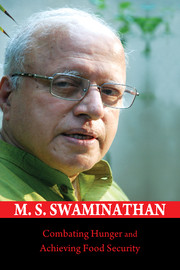Book contents
- Frontmatter
- Contents
- Foreword
- Preface
- Acknowledgements
- Abbreviations
- 1 Genesis and Growth of the Yield Revolution in Wheat
- 2 Our Agricultural Heritage
- 3 Shaping Our Agricultural Destiny
- 4 Thrust on Farm Revival
- 5 Nutri-farm Movement
- 6 Nutrition-sensitive Agriculture
- 7 Food Losses and Food Waste
- 8 Rice in Zero Hunger Challenge
- 9 Monsoon Management
- 10 Importance of Ecological Conservation
- 11 Caring for Ecology and Heritage
- 12 Conserving Biodiversity
- 13 Overcoming Hidden Hunger through Aquaculture
- 14 Biofuels – The Way to Go
- 15 Food Security
- 16 Vigilance for Sustainable Food Security
- 17 Food Security and Social Protection
- 18 Food Security and its Role
- 19 Sustaining the Livestock Revolution
- 20 Challenges in the Year of Science
- 21 Agriculture and Humanism
- 22 Fostering the Science of Science Communication
- 23 Olympic Move for Saving Children
- 24 Youth: The Agents of Change
- 25 Role of Women in Agricultural Production
- 26 Know-how to Do-how
- 27 From Bengal Famine to Right to Food
- 28 Financial Institutions and Fighting Food Inflation
- 29 Public Good Research in Agriculture
- 30 The Future of Indian Agriculture
- Bibliography
24 - Youth: The Agents of Change
Published online by Cambridge University Press: 18 December 2015
- Frontmatter
- Contents
- Foreword
- Preface
- Acknowledgements
- Abbreviations
- 1 Genesis and Growth of the Yield Revolution in Wheat
- 2 Our Agricultural Heritage
- 3 Shaping Our Agricultural Destiny
- 4 Thrust on Farm Revival
- 5 Nutri-farm Movement
- 6 Nutrition-sensitive Agriculture
- 7 Food Losses and Food Waste
- 8 Rice in Zero Hunger Challenge
- 9 Monsoon Management
- 10 Importance of Ecological Conservation
- 11 Caring for Ecology and Heritage
- 12 Conserving Biodiversity
- 13 Overcoming Hidden Hunger through Aquaculture
- 14 Biofuels – The Way to Go
- 15 Food Security
- 16 Vigilance for Sustainable Food Security
- 17 Food Security and Social Protection
- 18 Food Security and its Role
- 19 Sustaining the Livestock Revolution
- 20 Challenges in the Year of Science
- 21 Agriculture and Humanism
- 22 Fostering the Science of Science Communication
- 23 Olympic Move for Saving Children
- 24 Youth: The Agents of Change
- 25 Role of Women in Agricultural Production
- 26 Know-how to Do-how
- 27 From Bengal Famine to Right to Food
- 28 Financial Institutions and Fighting Food Inflation
- 29 Public Good Research in Agriculture
- 30 The Future of Indian Agriculture
- Bibliography
Summary
India is predominantly a land of the youth. It is soon likely to be a nation with the highest number of young women and men. The challenge before the government, academia, civil society, youth organizations, parents and teachers is to make our youthful human resource into a blessing for national happiness and prosperity, by providing opportunities for a healthy, productive and creative life.
In a book titled Last Child in the Woods (Hill, 2006), Richard Louv has drawn attention to the links between the absence of nature in the lives of today's wired generation and some of the most disturbing childhood trends, such as obesity, attention disorder and depression. He has termed this phenomenon ‘nature-deficit disorder’, or the human costs of alienation from nature. By weighing the consequences of the disorder, we can also become aware of how blessed our children can be – biologically, cognitively, and spiritually – through positive physical connection to nature. The best way of saving our children from nature-deficit disorder is to adopt learning procedures based on tools that can strengthen their understanding and appreciation of nature.
Both the need and the opportunities for a ‘learning revolution’ have never been as great as they are now. What is needed is the will to act. The words spoken by Dr Zakir Hussain while assuming the office of the President of India in 1967 are even more relevant today:
For sheer size, the tasks ahead of us are so demanding that no one can afford to sit back and just watch or let frustration become endemic in our country. The situation demands of us work, work and more work, silent and sincere work, solid and steady reconstruction of the whole material and cultural life of our people,
India is also predominantly a rural nation. The most important occupation in villages is agriculture, consisting of crop and animal husbandry, fisheries, forestry and agro-forestry, agro-processing and agri-business. While modern industry promotes jobless economic growth, agriculture and allied sectors promote job-led growth. A majority of youth in our country will have to, therefore, depend on agriculture for their vocation. Obviously, educated youth will be attracted to farm-related occupations only if farming becomes intellectually stimulating and economically rewarding. Since over 80 per cent of the farm holdings belong to small and marginal farmer categories, both farm and non-farm income will be essential to provide young farmers reasonable income security.
- Type
- Chapter
- Information
- Combating Hunger and Achieving Food Security , pp. 127 - 134Publisher: Cambridge University PressPrint publication year: 2016



